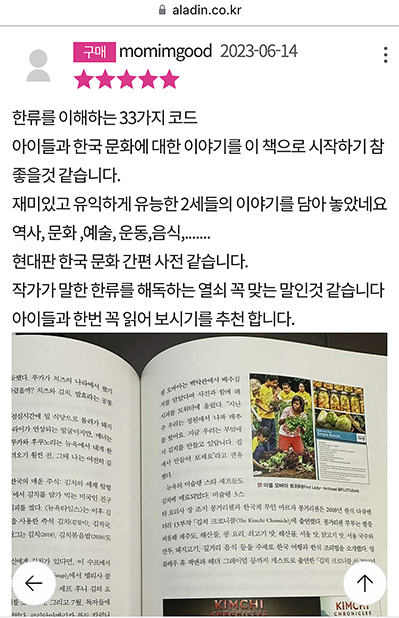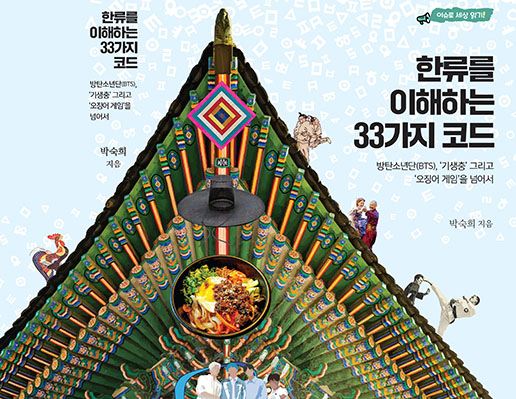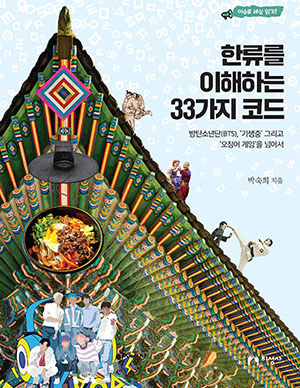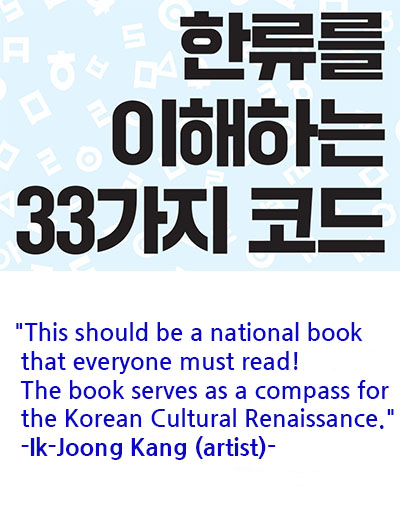[NEW BOOK] '33 Keys to Decoding the Korean Wave: Beyond BTS, Parasite and Squid Game' by Sukie Park
[New Book]
33 Keys to Decoding the Korean Wave:
Beyond BTS, "Parasite" and "Squid Game" <*Korean version>
한류를 이해하는 33가지 코드:
방탄소년단(BTS), ‘기생충’ 그리고 ‘오징어 게임’을 넘어서
By: Sukie Park (New York)
Publication Date: June 1, 2023
Publisher: Jisungsa (Seoul, South Korea)
Language: Korean
Volume: 512 pages
Size: 173 x 230 cm
Price: ₩45,000
"This should be a national book that everyone must read!
The book serves as a compass for the Korean Cultural Renaissance."
-Ik-Joong Kang (artist)-
https://www.aladin.co.kr/shop/wproduct.aspx?ItemId=318150433
How did the “Land of the Morning Calm” come to rock the world today?
Searching for keywords to decode Korean culture "K-Renaissance"
"May it be a coffee table book discussing our roots..."
K-Pop, K-Drama, K-Movie, K-Food, K-Classical Music, K-Ballet, K-Golf, K-Game, K-Beauty, K-Fashion, K-Spa... , Korean Wave (Hallyu). A book titled "33 Keys to Decoding the Korean Wave: Beyond BTS, Parasites, and Squid Games, *Korean version /한류를 이해하는 33가지 코드: 방탄소년단(BTS), 기생충, 그리고 오징어 게임을 넘어서, *한국어판)" by Jisungsa, Seoul) has been published.
"33 Keys to Decoding the Korean Wave: Beyond BTS, 'Parasite', and 'Squid Game'" written by Sukie Park, who has lived in New York since 1996, has worked as a culture reporter for The Korea Daily of New York (New York JoongAng Ilbo), and has owned and operates a website “New York CultureBeat” (www.NYCultureBeat.com) since 2012 which publishes original content on Korean cultural topics, examines and explores the Korean Wave, which is now shaking the world.
From the “spirit of bibimbap praised” by Nam June Paik, the "Godfather of video art," and the brilliant achievements of Korean artists; the “Ppalli Ppalli” spirit that accomplished the miracle of the Han River and K-quarantine; the spirit of resistance to Han and the power of Korean dramas and films; satire and humor and “Nunchi” (Koreans’ 6th sense); the connection between metal chopsticks and golf, piano, semiconductors, and nail salon businesses; the reasons for the success of Korean immigrants in the United States in laundry businesses; and the evolution of K-Fashion; Korean “slow food,” gochujang, kimchi and Michelin-starred Korean-American chefs; Bojagi (clothing) - Bossam (food) - Bottari (housing) wishing for good fortune; and strong female role models represented by Yu Gwan-sun, Haenyeo and Pak Se-ri, etc. The book presents the codes that created the Korean cultural renaissance, Hallyu.
In addition to leading K-pop, K-drama, and K-movie, which are currently at the forefront of the big wave of Korean culture influencing the West, Sukie Park profiles the original Hallyu star, the grandmaster Jhoon Lee, who taught Taekwondo to Bruce Lee, Muhammad Ali and Joe Biden; two-time Tony Award-winning Broadway costume designer Willa Kim; and two-time Time magazine’s 100 Most Influential People honoree David Chang, chef of Momofuku. Also the book contains the stories of eight artists who were influenced by Nam June Paik, as well as Korean-Americans and Korean adoptees who have achieved success in the fields of opera, ballet, classical music, art, film, and food service.
The author compares the Beatles and BTS, King Sejong of the Joseon Renaissance and Leonardo da Vinci of the Italian Renaissance, Hatshepsut, the female Pharaoh of ancient Egypt and Queen Seondeok of Silla Dynasty, Psy of 'Gangnam Style' and silent film star Charlie Chaplin, pop artist Andy Warhol and Korea's 'Mukbang (eating show)' , Anthony Bourdain ("Parts Unknown", CNN) and Mr. Choi Bool-Am ("Korean's Table", KBS), American Idol and National Singing Contest, etc.
On the other hand, the book analyzes historical writings and observations on Korea's culture and potential discovered by Father Norbert Weber, who stayed in Korea during the late Joseon Dynasty and the Japanese colonial era; Joseon traditional games compiled by Stewart Culin curator and the Netflix drama "Squid Game''; Homer Hulbert, American missionary, and world linguists' praise of Hangeul (Korean language); and Scottish painter Elizabeth Keith's portrayal of Joseon people. And novelist Pearl Buck compared King Sejong to Leonardo da Vinci. This book recalls the insights of Westerners who discovered the beauty and potential of Korea.
Sukie Park writes: "I think that the rich fruits of the Korean Wave now come from the seeds and nutrients that our ancestors had sown for a long time. Why don't we talk about the deep-rooted tree and the bountiful fruits? It would be nice if this became a coffee table book in the living room. It would be better if readers could suggest any other keywords of Hallyu and Korean Culture that I overlooked."
Ms. Park is currently translating this book (being published in June 2023 in the original Korean language version by Jisungsa, Seoul into English, so that anyone interested in Korean culture, including Koreans and overseas Koreans, as well as non-Koreans, other ethnicities married to Koreans, Korean adoptees and their families, and the BTS fan club ARMY, can read this book.

The first Alladin review about the book
<Purchase> Momimgood 2023-06-24
★★★★★
33 Keys to Decoding the Korea Wave
It would be great to start a story about children and Korean culture with this book.
It is a fun and informative story of competent 2nd generation individuals.
History, culture, art, sports, food,...
It's like a modern version of a simple dictionary of Korean culture.
The key to deciphering the Korean Wave, as the author said, seems to be the right word.
I highly recommend reading it with your children.
https://www.aladin.co.kr/shop/wproduct.aspx?ItemId=318150433
Buy this book here (10% discount)
<Quotes from the book>
“When the Germanic peoples were still running around in the forest, Joseon was already a highly cultural people, and it was a country that invented the printing press long before Germany.”
-Abbott Norbert Weber OSB (1870-1956)-
“It is the simplest writing system in the world. By combining consonants and vowels, any language and sound can be written. Sejong is the Korean Leonardo da Vinci as he is gifted with deep and various talents.”
-Pearl S. Buck (1892-1973), 1938 Nobel Prize-winning novelist-
“The Korean game Nyout may be regarded as the antetype of a large number of games which exist throughout the world.”
-Stewart Culin (1858-1929), “Korean Games,” p. 75, 1895
“The French and the English make 35 differentiations to the beef cuts, 51 cuts for the Bodi tribe, while the Koreans differentiate beef cuts into a staggering 120 different parts.’”
-Margaret Mead (1901-1978)-
“As long as Korea has the spirit of bibimbap, you can have confidence in the multimedia era.”
-Nam June Paik (1932-2006), video artist, 1967
“We mix and eat together, enjoying individual flavors and harmonious tastes together. It’s like the difference between a solo and a symphony in music… Bibimbap is a ‘Symphony of Flavors’.”
-Lee O-young (1934-2022), critic/ novelist, 2006
“Nunchi is the superpower of Koreans with a history of 5,000 years.”
-Euny Hong, “The Power of Nunchi”(2019)-
“South Korea’s unstoppable taste for haste: The ppalli-ppalli tendency can be seen in South Korea’s world-leading internet speeds, intensive language classes promising near-immediate results and popular speed-dating events.”
-BBC, 2018-
“Archery: Chopsticks, kimchi fingers the key to success?; Their names change, the Games change, but their arrows never falter – the South Korean women’s archery team are Olympic champions once again. “
-Reuters, 2012-
“South Korea brought K-pop and K-dramas to the world. The Korean language could be next.”
-CNN, 2023-
"South Korea Exports Its Glow: First came the wave of manufacturing, with Samsung and LG; then the K-pop stars, whose ubiquity reached its regrettable height with Psy. Now comes the latest import from South Korea: a formidable array of beauty products."
-New York Times, 2014-
"South Koreans to Americans: We'll teach you how to impeach a president."
-Washington Post, 2017
"South Korea shows that democaties can succeed against the coronavirus"
-Washington Post, 2020-
"It’s Bong Joon Ho’s Dystopia. We Just Live in It."
-New York Times, 2019-
https://www.aladin.co.kr/shop/wproduct.aspx?ItemId=318150433
33 Keys to Decoding the Korean Wave
한류를 이해하는 33가지 코드
CONTENTS
#Introduction
#1 비빔밥 정신 The Spirit of Bibimbap
The secret of K-Wave's success, including K-Pop, "Parasite", "Squid Game", Ik-Joong Kang (artist), Young Jean Lee (the first Asian female playwright in Broadway), Unsuk Chin (composer), Jennifer Koh (violinist) and David Chang (chef), probably originated from the blending of Korean bibimbap. Koreans are good at genre bending. Nam June Paik, "The Pioneer of Video Art," praised Korea's bibimbap spirit a long time ago.
#2 빨리빨리 문화 Culture of Ppalli Ppalli
Korea was successful in quarantine at light speed in the early days of the COVID-19 pandemic, the secret of many Koreans' success is efficiency and "quickly, quickly (ppalli, ppalli)" spirit. How the once-called "Land of Morning Calm" became a master of economic growth and speed warfare today.
#3 눈치의 달인들 Homo Nuncius Korean
A history of Korean-specific sixth sense and superpower "nunchi," and commentary on "Parasite" director Bong Joon-ho praising Martin Scorsese at the Academy Awards.
#4 저항의 민족 People of Resistance
Bong Joon-ho and Hwang Dong-hyuk of 'Parasite' and 'Squid Game' were once blacklisted. Korean movies and dramas contain a spirit of social criticism and a strong sense of theme/message. Why? In the history of the ordeal, Koreans have consistently resisted colonial rule and dictatorship, and the candlelight vigils that impeached President Park Geun-hye have the spirit of resistance of Koreans. Bong and Hwang were both named to TIME magazine's "100 Most Influential People in the World" (Bong Joon-ho in 2020 and Hwang Dong-hyeok in 2022).
#5 한(恨)과 한국영화 르네상스 Country of Trauma, Culture of Drama
Koreans have a unique sentiment of 'han'. The ethnic trauma of Koreans, such as separated families due to the division of the two Koreas after the war and the Ferry Sewol disaster, were more dramatic reality than the movies. Koreans who share their national sad feelings want more dramatic narratives and unforgettable characters. We are hungry for that. It is also the reason why Korean directors such as Park Chan-wook, Bong Joon-ho and Hwang Dong-hyeok have developed brutal aesthetics.
#6 쇠젓가락 유전자 The Magic of Metal Chopsticks
Koreans use metal chopsticks unlike Chinese and Japanese. Metal chopsticks, which require high concentration and sophisticated technology, are the open secret to success in Olympic golf, semiconductor, IT, plastic surgery, piano performance, cooks, and nail salons, etc.
#7 세탁의 장인들 Masters of Laundry
Koreans immigrated to the United States and succeeded in the dry cleaning business. In the snow fields of Korea, they also did laundry next to tanks during the war. Korean passion for washing also leads to art. Park Soo Keun, who recorded the highest auction price for modern Korean art at Christie's New York, enjoyed painting laundry scenes. Nam Jeong-ho's masterpiece dance 'Pallae, Womanhood Story', musicals, poetry, and even movies were inspired by washing clothes. Julian Kim and Peter S. Lee directed “Happy Cleaners (2019)”, a film about a Korean-American family's strife.
#8 복(福)을 싸드립니다: 보자기, 보따리와 보쌈 Bojagi, Bottari, & Bossam
Korean patchwork, multi-colored textile cloth reminiscent of Mondrian and Klee, a bundle moved by world-renowned artist Kimsooja and Momofuku chef David Jang's bossam all have a symbolic meaning surrounding good luck, "BO". On the philosophy of wishing the blessings of Koreans which have become motifs in art and food.
Joseon, Corea, Korea
#10 호머 헐버트와 세계인들의 한글예찬 Hangeul, the Korean Alphabet
#11 '오징어 게임'과 '놀이의 왕국' 코리아 'Squid Game' and Homo Ludens Koreans
#15 음주가무-노래하고 Sing
#16 음주가무-춤추고 Dance
"The Figure Skating Queen" Yuna Kim (*TIME 100 in 2010) has the DNA of a dancer, and the only Asian principal dancers at the Mariinsky Ballet (Russia), Kimin Kim, and at the American Ballet Theater (Hee Seo, and Joo Won Ahn) are Korean. Korean dancers have been winning awards at international ballet competitions and breaking dance competition "Battle of the Year''. Of course, dance is an essential part of K-Pop.
The Power of Koreans
#20 82년생 김지영 도서 한류 열풍 K-Books and Korean Feminism
#24 '비디오 아트의 선구자' 백남준과 후예들 Nam June Paik and His Descendants
#25 K-클래식: 정경화에서 임윤찬까지 콩쿠르 강국 The Korean Musical Mystery
#26 비틀즈 Vs. 방탄소년단 The Beatles vs. BTS
#27 피는 물보다 진하다 K-Adoptees Shine in the Art World
K-Culture Renaissance
#29 K-Art 단색화 부활하다 The Revival of the Korean Monochrome Painting
#31 K-Beauty 성공 신화 The Myth of K-Beauty
#32 K-Spa '한국 스파의 디즈니랜드' 찜질방 Jjimjilbang, The Disneyland of Korean Spa
#33 K-Quarantine 기생충, 킹덤과 코로나 팬데믹 K-Quarantine: "Parasite" "Kingdom" and Pandemic
Bong Joon-ho's movie "Parasite" (2019) and the Netflix zombie drama "Kingdom" seem to have foretold the COVID-19 pandemic. "We live in Bong Joon-ho's dystopia," the New York Times said in a review of Parasite. We had to maintain a six-foot "line" during the pandemic, like the lines of Parasite. New York Magazine said in July 2020 that Kingdom heralded the pandemic under the title "Kingdom Feels Like a Nightmare of Now."
Sukie Park
A native Korean, Sukie Park studied journalism and film & theater in Seoul. In March 2012, she founded www.NYCultureBeat.com, a Korean-language website about cultural events, food, wine, shopping, sightseeing, travel and people in New York City, for which she contributes original stories on a daily basis. In 2013-2014, she has also contributed interviews and articles on Korean artists, actors, musicians and chefs to "Inside Korea," a special section distributed with The New York Times' Friday edition. From June 2004 through December 2011, she was the principal journalist covering cultural affairs, food and travel for The Korea Daily in New York (Joongang Ilbo, 뉴욕중앙일보), the largest Korean-language newspaper in the New York metropolitan area. Sukie previously worked as a reporter with several Korean pop, cinema, photography and video magazines, as a writer at Korean radio (KBS-2FM 영화음악실/ Film Music Salon) and television (MBC-TV 출발! 비디오여행/ Let's Start! Video Journey) stations, and as a copywriter at a video company (대우 비디오/ Dae Woo Video). She served as a jury member for The 1st Seoul Short Film Festival (1995) presented by Samsung Culture Foundation. She also covered the Tokyo International Film Festival (1989, 1991) and Hong Kong International Film Festival (1993) as a correspondent. As a New York correspondent she contributed stories for "Cine 21" and "Film 2.0", magazines published in Korea. She has edited two books, "The Movie That Changed My Life" (나를 움직인 이 한편의 영화, 1990), a collection of essays by Korean filmmakers, actors and writers, and "Drawing Helen Kim: The Master Who Changed Our Lives" (선생님 그리기: 우리를 움직인 스승 김활란, 1997), a collection of writings about the first President of Ewha Womans University. She is the author of the recently-published "33 Keys to Decoding the Korean Wave (한류를 이해하는 33가지 코드)". NYCultureBeat received the 2014 Cultural Merits Award from H&Y Marketplace. Sukie has lived in New York City since January of 1996.
한류를 이해하는 33가지 코드
*Buy Here <US>
-KBOOKSTORE US $48.60
https://kbookstore.com/catalog/product/view/_ignore_category/1/id/694563/s/33-9788978895323
-반디북스 Bandi Books US $51.30
https://www.bandibookus.com/front/product/detailProduct.do?prodId=4461303
888-880-8622(Toll Free)
-고려서적 Koryo Books $90-$100
맨해튼 212-564-1844/ 뉴저지 201-461-0008
*Buy Here <Korea>
-알라딘 Aladin ₩40,500
https://www.aladin.co.kr/shop/wproduct.aspx?ItemId=318150433
[신간 안내] 한류를 이해하는 33가지 코드: 방탄소년단(BTS), 기생충과 오징어 게임을 넘어서
https://www.nyculturebeat.com/index.php?mid=Lounge2&document_srl=4097797
[언론 보도] 한류를 이해하는 33가지 코드
한국 중앙일보(중앙Sunday), 뉴욕 중앙일보, LA 중앙일보, 밴쿠버 중앙일보, 뉴욕일보, 라디오 코리아
https://www.nyculturebeat.com/index.php?mid=CulBooks&document_srl=4097741
[Media Coverage] '33Keys to Decoding the Korean Wave: Beyond BTS, Parasite and Squid Game'
https://www.nyculturebeat.com/index.php?document_srl=4097755&mid=Lounge2
[서점 통신] 한류를 이해하는 33가지 코드: 출간 이후
교보문고(반포 지점) 비치/ 알라딘 주간 베스트 인문-문화이론 부문 40위(6/13)/ 알라딘 첫 리뷰
https://www.nyculturebeat.com/index.php?mid=Lounge2&document_srl=4098111








 언론 보도: '한류를 이해하는 33가지 코드'
언론 보도: '한류를 이해하는 33가지 코드'
 CulBooks (3) 포노 사피엔스: 스마트폰이 낳은 신인류, 최재붕 지음
CulBooks (3) 포노 사피엔스: 스마트폰이 낳은 신인류, 최재붕 지음

